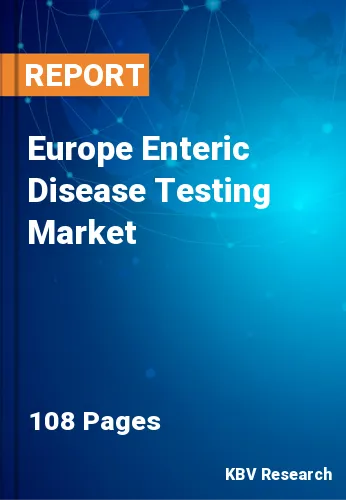The Europe Enteric Disease Testing Market would witness market growth of 2.8% CAGR during the forecast period (2023-2029).
Expanding access to clean drinking water and improved sanitation is crucial for prevention. Although there has been proven progress in this area, it will be long before everyone has access to clean water and adequate sanitation. As a result, vaccinations can hasten the decline in diarrheal mortality and morbidity from diseases in LMICs. Additionally, several intestinal infections are a major burden on LMICs and industrialized nations, causing significant disease. In the years before the licensing of the monovalent vaccine, rotavirus significantly burdened the healthcare networks of developed countries in terms of clinic visits and hospitalizations.
In developed nations, the number of old people is growing due to rising life expectancy and population aging. Immunosuppressive medications are also being used more frequently in these contexts. It has been established that enteric infections such as those caused by the NTS, Clostridium difficile, and norovirus are more likely to affect the elderly, immunocompromised individuals, and people with complex medical conditions.
In Europe, the two key initiatives that have been implemented to improve public health and safety in the European Union are the Enter-net DSN has been expanded to include all Member States, ensuring that all countries contribute to the worldwide surveillance network and to improve the response and recognition to foodborne pathogens such as Salmonella, VTEC, and Campylobacter. By implementing appropriate measures, the EU aims to minimize the risk of contamination and protect the health of EU citizens. Enter-net is responsible for tracking the incidence of enteric diseases. It is focused on achieving the completeness and timeliness of data collected on human infections caused by Salmonella, Vero cytotoxin-producing E. coli, and Campylobacter. All of these elements are supporting the development of the regional market.
The Germany market dominated the Europe Enteric Disease Testing Market by Country 2022, and would continue to be a dominant market till 2029; thereby, achieving a market value of $316.3 million by 2029. The UK market is exhibiting a CAGR of 2% during (2023 - 2029). Additionally, The France market would showcase a CAGR of 3.5% during (2023 - 2029).
Based on End User, the market is segmented into Hospital Laboratories, Pharmaceutical & Biotechnology Companies, and Academic & Research Institutes. Based on Disease Type, the market is segmented into Bacterial, Viral and Parasitic. Based on Product Type, the market is segmented into Reagents & Consumables and Equipment. Based on Technique, the market is segmented into Immunodiagnostics and Molecular Diagnostics. Based on countries, the market is segmented into Germany, UK, France, Russia, Spain, Italy, and Rest of Europe.
Free Valuable Insights: The Worldwide Enteric Disease Testing Market is Projected to reach USD 4.6 Billion by 2029, at a CAGR of 3.2%
The market research report covers the analysis of key stakeholders of the market. Key companies profiled in the report include Merck KGaA, Thermo Fisher Scientific, Inc., SGS S.A., Eurofins Scientific SE, Bureau Veritas S.A., Intertek Group PLC, TÜV Nord Group, PerkinElmer, Inc., Becton, Dickinson and Company and Neogen Corporation.
By End User
By Disease Type
By Product Type
By Technique
By Country
Our team of dedicated experts can provide you with attractive expansion opportunities for your business.

